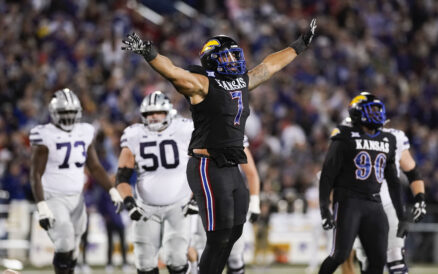Finals week is drawing to a close at the University of Kansas and so is KU’s nonconference men’s basketball schedule. The Jayhawks have just three games remaining before they open Big 12 Conference play on Jan. 6.
Although, as KU coach Bill Self has been fond of saying lately, the sample size is small, each Big 12 team in the newly expanded conference has played between eight and 10 games. Here’s a quick look at how everyone is doing before they all start to face off next month. All stats are through Thursday morning.
No. 6 Baylor (9-0): So far, so good for the Bears. Freshman guard Ja’Kobe Walter, who came in as one of the highest-ranked freshmen in the nation, scored 28 points in a win over Auburn in his collegiate debut and still leads the Bears with 14.9 per game.
Production has come from all over for the league’s top offense, which has six double-digit scorers. Guard RayJ Dennis isn’t far behind Walter in scoring and distributes the ball well for more than six assists per game.
No. 18 BYU (9-1): The Cougars are still one of the surprises of the season so far, thanks to unexpected big wins over teams like San Diego State and NC State, but a loss at rival Utah on Saturday certainly put a damper on things.
Still, BYU ranks among the national leaders in both scoring and rebounding, thanks to players like Spencer Johnson (averaging 11.6 points and 6.1 rebounds) and Noah Waterman (11.0 points, 7.1 rebounds), not to mention Jaxson Robinson coming off the bench for a team-high 18 points per game. No one is averaging more than 25 minutes per game on the deep roster.
Evansville guard Gage Bobe, center, defends against BYU guard Jaxson Robinson (2) during the second half of an NCAA college basketball game Tuesday, Dec. 5, 2023, in Provo, Utah.
Cincinnati (8-1): Another newcomer to the conference this season, the Bearcats were unbeaten until — much like BYU — they fell to rival Xavier in the Crosstown Shootout on Saturday.
One important part of the Bearcats’ season has taken place off the court, as they had to fight for eligibility for Utah Valley transfer Aziz Bandaogo (and were successful) and are now doing so for Temple transfer Jamille Reynolds, who may be able to take the floor after Wednesday’s federal temporary restraining order allowing two-time transfers to play immediately.
Viktor Lakhin, a redshirt junior forward from Russia, is leading the way with 14.7 points and 8.8 rebounds per game.
No. 4 Houston (10-0): The Cougars are No. 1 in the country in scoring defense by a fairly wide margin as they have allowed less than 50 points per game.
It helps on the other end of the floor to have added Baylor transfer L.J. Cryer, who is averaging 17.8 points per game and shooting 39.8% from beyond the arc, to the mix. That mix already included key contributors from last year’s team, familiar names like Terrance Arceneaux, Ja’Vier Francis, J’Wan Roberts, Emanuel Sharp and Jamal Shead.
Iowa State (8-2): Despite back-to-back losses to Virginia Tech and then-No. 12 Texas A&M at the ESPN Events Invitational, it’s been generally a solid start for the Cyclones.
Junior guard Keshon Gilbert has shone of late, with four 20-plus-point scoring performances in his last six games, all wins for ISU, including a 22-point, 10-rebound double-double in a victory over VCU.
Tamin Lipsey is doing it all in the backcourt and averaging an impressive 3.6 steals per game. Led by Lipsey, the Cyclones are forcing more turnovers per game than even Houston, with a mark of 19.2 per game that is good for third in the country.
Iowa State guard Tamin Lipsey (3) reacts after making a basket during the first half of an NCAA college basketball game against Iowa, Thursday, Dec. 7, 2023, in Ames, Iowa.
Kansas State (8-2): The Wildcats have been nothing if not dramatic this season. They needed last-minute heroics to beat Oral Roberts, North Alabama and Villanova in three straight overtime games.
Then there was a campus controversy about forward Nae’Qwan Tomlin’s indefinite suspension which led to protests outside the home of university president Richard Linton, followed by Tomlin’s dismissal from the team and official statements by coach Jerome Tang, Linton and athletic director Gene Taylor.
Through it all, K-State has relied heavily on the scoring of Tylor Perry, Arthur Kaluma and Cam Carter (all between 16 and 17 points per game) to offset the Big 12’s worst scoring defense.
No. 11 Oklahoma: Porter Moser has his Sooners on the rise after a pair of lackluster seasons, thanks to quality wins over USC and Arkansas. The Sooners’ numbers don’t leap off the page, but they’re defending well on the perimeter and maximizing their trips to the free-throw line.
Sophomore guard Otega Oweh hit the game-winner against the Trojans and leads the team with 15.2 points per game, and he’s teamed well with Siena transfer Javian McCollum.
Oklahoma State (4-5): The Cowboys opened up with a home loss to Abilene Christian and really haven’t recovered. They lost two games by identical 66-64 scores to St. Bonaventure and Notre Dame at the Legends Classic and initially bounced back with a pair of home victories, but then lost to Creighton (a top team nationally) and Southern Illinois (not as much).
OSU has allowed the highest opponent field goal percentage in the Big 12 while also scoring the second-fewest points per game. East Carolina transfer Javon Small (17.1 points, 5.1 rebounds, 4.8 assists per game) has been a bright spot.
Oklahoma State guard Javon Small shoots a layup around Creighton center Ryan Kalkbrenner in the second half of an NCAA college basketball game, Thursday, Nov. 30, 2023, in Stillwater, Okla.
TCU (7-1): TCU has played what KenPom calls the weakest schedule in the country as it has mowed down a long line of mid-majors. The Horned Frogs then beat Georgetown on a buzzer-beater by Emanuel Miller that counted even though he stepped out of bounds, because the call could not be reviewed. They lost to No. 13 Clemson 74-66 in their first game against a highly regarded opponent.
Miller has started the year well and earned Big 12 player of the week honors after putting up 29 points on 12-for-18 shooting in that Georgetown game.
No. 19 Texas (7-2): The Longhorns will undoubtedly contend as usual in their final Big 12 season with one of the biggest offseason transfer additions in guard Max Abmas. But they didn’t compete well in their two highest-profile games of the year so far as they were unable to muster a comeback against UConn and got blown out by Marquette.
UT did a good job picking talent up from the portal — not just Abmas (Oral Roberts) but Kadin Shedrick (Virginia) and Ithiel Horton (UCF).
Texas guard Max Abmas (3) drives past Texas State guard Elijah Tate (15) during the second half of an NCAA college basketball game in Austin, Texas, Thursday, Nov. 30, 2023.
Texas Tech (7-2): It’s been an up-and-down start to Grant McCasland’s tenure in Lubbock. The Red Raiders knocked off Texas A&M early, went 2-1 in the Bahamas with wins over Northern Iowa and Michigan and a decisive loss to Villanova, and took a 103-95 overtime defeat on the road at Butler.
McCasland’s North Texas teams were renowned for their defense, but the Red Raiders are just ninth in scoring defense and 10th in turnover margin thus far, and rank 13th in blocks and steals.
UCF (6-3): The headline for the Knights is that Jaylin Sellers leads the conference in scoring, right above Hunter Dickinson and Kevin McCullar Jr. Sellers put up 34 in, of all things, a home loss to Stetson on Nov. 26.
The new-look Knights were picked last in the league this year. They have indeed been one of its worst defenses so far and most disjointed offenses (with a 0.93 assist-to-turnover ratio). But they have some positive indicators in the scoring of Sellers and the league-high shot-blocking of Ibrahima Diallo, a San Jose State transfer.
West Virginia (4-5): This was always going to be an odd season for the Mountaineers following the DUI arrest and resignation of longtime coach Bob Huggins. That came with plenty of turnover, and indeed the Mountaineers’ roster is still in flux with the prospect of transfer guard RaeQuan Battle playing following Wednesday’s temporary restraining order.
On the court, it’s been a struggle at times for WVU, which has lost at home to Monmouth, St. John’s and Pittsburgh. The Mountaineers rank at or near the bottom of the Big 12 in most statistical categories. But they can rely on Syracuse transfer center Jesse Edwards, a double-double machine averaging 16.2 points, 9.3 rebounds and more than two blocks per game.

 AP Photo/Tony Gutierrez
AP Photo/Tony Gutierrez
 AP Photo/Rick Bowmer
AP Photo/Rick Bowmer AP Photo/Charlie Neibergall
AP Photo/Charlie Neibergall AP Photo/Mitch Alcala
AP Photo/Mitch Alcala AP Photo/Eric Gay
AP Photo/Eric Gay